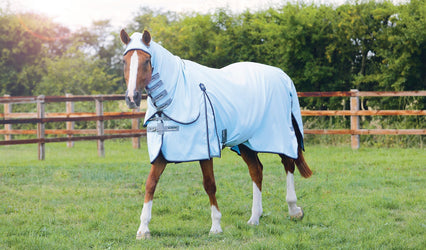Posted
As the weather gets warmer many horse owners are excited to spend quality time in the sun. However, some curse the warmer weather as it can only mean one thing... Sweet Itch. There have been many discussions of horses suffering from sweet itch, but what is it? And how can we here at Premier Equine help your horse through the spring/summer months?

What is Sweet Itch?
Despite what the name suggests, there is nothing sweet about Sweet Itch. The skin condition is an allergic reaction to the saliva of biting lice, midges, and certain types of flies. The most common areas horses are affected are the; mane, withers, and the tail, although some horses suffer all over their body.
Symptoms of Sweet Itch:
The symptoms and severity can vary, veterinary advice is recommended in order to correctly diagnose the issue and to offer a treatment and prevention plan. Some of the main symptoms are; loss of hair, skin warm to touch, and broken skin in the affected area. This often causes great discomfort to the horse which results in excessive scratching, rubbing, and sometimes biting their skin. Horses are more likely to have agitated behaviour when in work due to the symptoms of Sweet Itch.
Prevention is better than cure...
As the saying goes prevention is better than cure... it is better to try to prevent/control sweet itch than to treat it. There a number of products and management changes that horse owners can adopt to make sure their horses stay comfortable in the spring/summer.
Horse Rugs:
Whilst many products are effective in repelling flies, they do not provide long-lasting protection throughout the day. It is recommended to use a Sweet Itch specific rug to prevent insect interaction with the skin. Specialist Sweet Itch rugs have been developed to provide as much protection as possible from biting insects, fabrics are usually more substantial than regular fly rugs to protect the skin from midges, and they usually offer greater coverage.

Following extensive research into the requirements of Sweet Itch sufferers, both the Sweet Itch Buster with Belly Flap and Buster Sweet Itch with Surcingles are crafted from a 1000D ripstop polyester, which is densely woven which helps to keep the smallest of insects at bay. The fabric is not only a hard-wearing resilient material, but it's also super lightweight and highly breathable, allowing optimum comfort for the horse.
An added supersized tail flap at double thickness helps to protect the tail area where horses are likely to rub. If ultimate protection is required then the added benefit of a Belly Flap on the Sweet Itch Buster Fly Rug with Belly Flap has been designed for maximum coverage.
Fly Masks:
Sweet itch sufferers are often bothered by biting insects around the more sensitive parts of the face and ears. Fly masks not only offer protection from biting insects but also offer protection from harmful UV rays. The Buster Fly Mask and the Buster Fly Mask Xtra offers protection against irritating insects and gives plenty of clearance from the delicate eye area.
Bug & Fly Boots:
Pro-Tech Bug & Fly Boots are also beneficial for those horses really suffering, crafted from 3D sports mesh boots allows the air to flow and circulate around the leg's keeping them cool throughout the summer months.

Field Management:
Choosing the correct time to turn out will also help with the management of Sweet Itch. With flies being the main culprit the best thing to do is to work around them. As the midge fly is crepuscular (meaning they are most active during dawn and dusk), avoiding turn out at the beginning and the end of the day is advisable. Midges also favour hot, humid days, watercourse, and tree lines. Avoiding these environments will give your horse the best chance of being comfortable.
Fly Sprays:
Fly repellents are very common and they are on the market in the form of sprays, powders, and gels. However, while they are effective they do not provide long-lasting protection. Supplements can be added to your horse's feed to help deter flies and insects, however, we advise that you consult your vet & feed specialist on this.
**Top Tip: Wash your sweet itch rug regularly, as a build-up of dirt, sweat, and grease can become a breeding ground for bacteria and could irritate your horse's skin, particularly if they are already sore. It's a good idea to have two rugs so that there is always a fresh one for them to wear while the other is being washed**
*** We recommend that if your horse's condition is deteriorating, seek medical advice from your veterinarian***
All the best, PE


